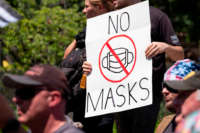
As the U.S. reaches the grim milestone of 500,000 deaths from COVID-19, the National Institutes of Health Director Francis Collins has said that the proliferation of the virus due to partisan resistance and politicization around wearing a face mask could be responsible for tens of thousands of deaths.
Collins said that misinformation around COVID was particularly harmful around mask-wearing. In the early months of the pandemic, evidence showed that wearing a mask helped to stop the spread of the disease, said Collins. “And yet, with a variety of messages through a variety of sources, mask-wearing became a statement about your political party or an invasion of your personal freedom,” he said.
“A mask is nothing more than a life-saving medical device, and yet it got categorized in all sorts of other ways that were not factual, not scientific, and, frankly, dangerous,” Collins continued. “And I think you could make a case that tens of thousands of people died as a result.”
Last year, as the pandemic was setting in within the U.S., wearing a mask became especially stigmatized among the right wing. Former President Donald Trump was saying that he didn’t trust masks and that people were wearing masks just to spite him. Those statements from the then-president, coupled with people’s personal beliefs about things like masculinity stigmatized mask-wearing among conservatives. Following Trump’s lead, many other Republicans also took to criticizing mask-wearing, even making bizarre and harmful claims about the practice in some cases.
“It’s so disappointing that such behaviors could be chosen intentionally by people who have access to real public health information and yet would decide not to put on the mask in order to make some other kind of statement,” Collins said when asked about Trump’s resistance to wearing a mask. “Perhaps with some sense that they’re immune from the consequences.”
Though Trump did eventually begin occasionally wearing a mask, the damage had been done. According to a Pew Research Center poll done in June, 23 percent of Republicans were saying that masks should either rarely or never be worn when in public, as opposed to 4 percent of Democrats saying the same thing. Only 29 percent of Republicans at the time said that masks should always be worn in public, as compared to 63 percent of Democrats.
By late summer, Republicans mentioned masks or mask-wearing the most compared to other things when describing the biggest negative impacts on their lives from COVID, according to a different poll by Pew. By contrast, Democrats’ top two concerns mentioned were related to family and work, and masks ranked closer to the bottom.
In some ways, this contrast persists even now, as mask-wearing has become increasingly normalized and recommended by health officials over the course of the pandemic. When President Joe Biden said last year that he would call Republican governors to ask them to install mask mandates and followed it up this year by signing a mask mandate on federal property, Republicans were quick to raise objections. First they countered by telling people not to bother with masks and following Biden’s executive order, said they would challenge the mask mandate in court.
The U.S. is still in the throes of the pandemic, but some Republican governors are lifting their mask mandates as infection numbers fall slightly following the post-holiday spike. In Montana, for example, where the governorship just flipped from Democrat to Republican in the recent election, the new GOP governor has rescinded the previous governor’s mask mandate. All in all, the 15 states that don’t currently have a statewide mask mandate are all run by Republican governors.
Even though some governors may think that it’s time to lift mask mandates, Anthony Fauci, Biden’s chief medical adviser, said on Sunday that Americans who wish to protect themselves and others by wearing a mask may expect to wear one through the end of 2021 and even into 2022. Though cases are currently declining, and vaccine distribution is ramping up, “I want it to keep going down to a baseline that’s so low there is virtually no threat,” said Fauci.
